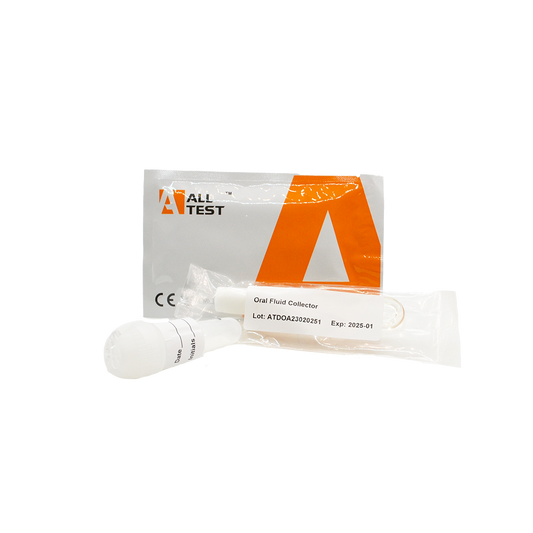Quick Summary - Testing for Ketamine (Special K)
There are many different drug tests for ketamine. The best drug test for ketamine would be a urine ketamine test below. Alternatively you can view all of our ketamine drug tests here, for saliva ketamine tests and multi drug combinations.

Urine Drug Test Strip (Ketamine)
From £4.40 GBP
The alarming rise in Ketamine use in the UK
In 2024, ketamine has firmly positioned itself as the "new pub drug," and its rising prevalence in social spaces is both alarming and fascinating. Known medically as an anesthetic, ketamine has long been used in surgeries and emergency rooms. But the past few years have seen this powerful dissociative substance move from operating tables to nightclubs, pubs, and underground party scenes, garnering attention as a drug of choice in recreational settings. Its journey from a controlled medical substance to a popular social drug signals a cultural shift worth examining.
In this blog, we’ll explore why ketamine has become popular in pub scenes, its physiological effects, the dangers and legal implications, and what the future might hold for this substance in the world of recreational drugs.
What is Ketamine?
Ketamine, developed in the 1960s, was originally used as an anesthetic for humans and animals. It is classified as a dissociative anesthetic, meaning it causes users to feel disconnected from their body and environment. The drug has been approved for use by the World Health Organization for medical purposes, particularly for pain relief, sedation, and general anesthesia.
In recent years, however, ketamine has also been explored in a clinical setting for treating mental health disorders like depression, post-traumatic stress disorder (PTSD), and anxiety. Its ability to trigger rapid changes in mood and consciousness has opened up new avenues in therapeutic research. However, this therapeutic potential also contributes to its appeal in recreational settings, as people seek both an escape and an altered state of consciousness.
The Ketamine experience: Why is it popular in pubs?
Ketamine is unique compared to other drugs like cocaine or MDMA. It creates a sense of detachment from reality, often described as “floating” or experiencing an out-of-body sensation. Users may feel as if they are observing themselves from a distance, which can be euphoric for some and deeply disturbing for others.
When used recreationally in pubs or clubs, ketamine, commonly referred to as “K” or “Special K,” can induce:
Euphoria: A light sense of joy and wellbeing.
Dissociation: A mental state where the individual feels disconnected from their physical body and surroundings.
Sensory distortions: Visual and auditory hallucinations are common.
Relaxation: It dulls the sensation of pain and can make users feel physically and emotionally numb.
Unlike the high-energy rush of stimulants like cocaine or the feel-good, empathetic high of MDMA, ketamine tends to slow things down, making it a favourite for pub-goers looking for something that complements alcohol but doesn’t result in the jittery, anxious comedowns associated with other recreational drugs.
The reason ketamine has gained traction in pub culture in the UK comes down to its accessibility and the experience it offers. As the effects of the drug can last for 45 minutes to an hour, it's a relatively short experience compared to other drugs, which can allow users to fit in a quick trip to a dissociative state during a night out. It also doesn't tend to cause intense social interaction like MDMA, making it suitable for more laid-back, low-energy settings like pubs where conversation and hanging out are the primary activities.
Price: Ketamine’s price, typically ranging between £15 and £30 per gram, makes it a much more affordable option compared to its main competitor, cocaine, which can cost up to four times as much. This price difference is a significant factor in its growing popularity in the UK, particularly in pub and nightlife scenes. Furthermore, while cocaine is often heavily cut with other substances—sometimes dangerous additives like levamisole or synthetic stimulants—ketamine is generally seen as purer, providing a more predictable and controlled experience for users. This relative affordability and perceived purity make ketamine an attractive alternative for many, especially in a market where drug quality is becoming increasingly uncertain. Additionally, the shorter duration of ketamine's effects allows users to maintain control over their night out, contributing to its appeal as a pub drug.
The dark side of Ketamine misuse
While ketamine can offer a unique experience, its rise in popularity is not without significant risks. Ketamine is a powerful substance with effects that can vary widely depending on dosage, individual sensitivity, and environmental factors. For recreational users, these dangers are particularly pronounced.
1. Risk Of Addiction: While ketamine has not been traditionally considered highly addictive, repeated use can lead to psychological dependence. The pleasurable dissociation that ketamine offers can become habit-forming, leading users to chase that "out-of-body" experience more frequently.
2. Physical Health Dangers: Ketamine's use can lead to serious health issues. Frequent or high-dose users risk damage to their bladder, kidneys, and liver. A condition known as "ketamine bladder" can develop, where users experience intense pain and may suffer permanent damage. To find out more information about Ketamine cystitis visit our medical website Valuemed
3. Mental Health Risks: While ketamine is being studied for therapeutic benefits in controlled, medical environments, recreational use without proper supervision can lead to adverse psychological effects. Chronic use has been linked to cognitive impairments, memory loss, and an increased risk of depression and anxiety—ironically, the very conditions it’s being studied to treat.
4. Accidents And Injury: One of the most immediate risks of ketamine use in pubs is the increased likelihood of accidents. Since ketamine distorts perception and impairs motor skills, users are more prone to falls, accidents, or being unable to protect themselves in risky situations.
Legal status of Ketamine
Ketamine is classified as a Schedule III controlled substance in the United States and is similarly regulated in most other countries. In the UK, it is classified as a Class B drug, meaning it is illegal to possess, sell, or distribute Ketamine. The legal ramifications for being caught with ketamine can include hefty fines, imprisonment, and a criminal record.
Despite these strict regulations, the recreational use of ketamine is growing, largely fueled by its availability on the dark web, as well as diversion from legitimate medical supplies. Law enforcement agencies have reported increased seizures of the drug, and there is growing concern that ketamine’s rising use in nightlife settings could lead to more stringent crackdowns.
The presence of ketamine in the pub scene is a stark reminder that drug culture continues to evolve, with new substances constantly entering the social landscape, often faster than authorities can respond.
Social impacts and trends
The social aspect of ketamine use cannot be ignored. In the 1990s and early 2000s, drugs like MDMA dominated the nightlife scene, driving high-energy, communal experiences. Ketamine, on the other hand, is more introspective, quiet, and detached, aligning with a broader cultural shift in nightlife behaviors.
As society becomes increasingly accustomed to digital distractions and virtual interactions, the detachment offered by ketamine may resonate more deeply with a generation more isolated from face-to-face connections. It’s not uncommon to see people glued to their phones even when surrounded by friends, and in many ways, ketamine’s dissociative effects mirror that modern disconnection from the world.
In some parts of the UK, ketamine use is so normalised that pubs and clubs often have designated "K-holes," quiet areas where users can retreat to ride out the more intense parts of their experience. This shift from hyper-social, stimulant-driven environments to these quieter, introspective spaces signifies a notable change in the culture of drug use.
The Future of Ketamine in Pub Culture
Looking forward, ketamine’s rise as the new pub drug will likely continue as long as there is demand for its unique effects and a steady supply. However, the future is uncertain. Increasing regulation and policing could push the drug further underground, or its popularity could lead to more education and harm-reduction strategies to help mitigate risks.
Public health officials and policymakers face a dilemma: how to curb the illegal use of ketamine while also recognizing its potential therapeutic value in treating mental health disorders. As more people become aware of both the benefits and dangers of ketamine, its place in society will undoubtedly evolve.
The rise of ketamine as a recreational drug highlights how drug trends shift in response to broader social, psychological, and cultural dynamics. Whether this trend will be a passing phase or a permanent feature of pub culture remains to be seen, but for now, ketamine is having its moment.
Ketamine and workplace drug testing
See all drug tests that detect Ketamine
In conclusion, ketamine’s transition from a medical anesthetic to a pub drug in 2024 reveals much about the shifting landscape of recreational drug use. As it continues to grow in popularity, it’s crucial to balance its therapeutic potential with the significant risks it poses when used irresponsibly. How society responds to this growing trend will shape not only the future of ketamine but also the broader context of drug use in social spaces.





